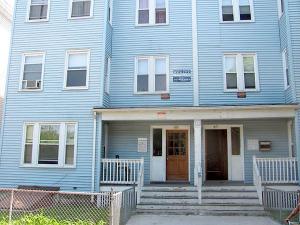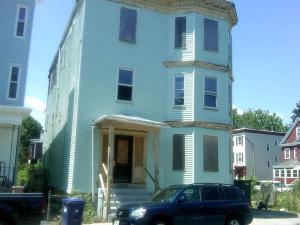June 23, 2011
 47-49 Savin Hill Ave: Six-family house has been source of concern in Savin Hill.First in a two-part series.
47-49 Savin Hill Ave: Six-family house has been source of concern in Savin Hill.First in a two-part series.
When 19-year-old Derek Matulina was shot to death at the Savin Hill MBTA station on May 7, his father instinctively knew the house where the alleged killer, Nhu Ahn Nguyen, was initially reported to have fled after the shooting.
Having lived in Savin Hill for over a decade, Robert Matulina, now 61, remembered the house as an eyesore even before he left the neighborhood 10 years ago. While police now doubt the initial media accounts that the house had been a hiding place for the alleged killer and, possibly, witnesses to the crime, it was not surprising that those familiar with the neighborhood would find such reports credible.
The three-decker at 47-49 Savin Hill Ave. has long been in physical decline, and community and City Hall tolerance to that decline had allowed the six-family house to become a hang-out for neighborhood toughs, if not a breeding ground for crime.
If it could happen at such a highly-visible address on Savin Hill’s main road, then the entire neighborhood was vulnerable. That was the message that Robert Matulina as well as Derek’s sister, Leah Murphy Bailly, underscored at a neighborhood meeting that they attended just a few days after Derek’s murder. The meeting— held at the Cristo Rey school building — drew an estimated 300 people, including several of Boston Mayor Thomas M. Menino’s closest advisers. And spurred by that meeting’s message, the city has established an initiative to strike at the nagging problem of neighborhood crime by focusing on the properties that generate the most police 911 calls.
In the coming days, the administration intends to begin directing owners of properties that have been responsible for eight or more police calls in the past year to take steps toward solving the problems by warning or evicting the troublemakers. If they fail to take action, the owners will face fines themselves.
At the outset, the landlords will be contacted by the city and told of the high number of crimes that have taken place at the residences. The landlords will be told that if they don’t participate in an action plan to address the problem immediately, the city will begin to assess fines against them under a new municipal ordinance that Menino submitted to the Boston City Council.
Although many details of the effort are still be worked out – it likely will take statutory changes to make the job of evicting problem tenants easier – the initiative of forcing landlords to get more involved in policing their tenants’ behavior is a good one, city officials said.
“The mayor was very focused on this right from the start, from the weekend that the shooting took place,” said Michael Kineavy, Menino’s chief of policy and planning who is overseeing a multi-agency task force aimed at addressing the problem. “He impressed on us on the need for doing things differently. Let the police do their work there first, but once they’re done, let’s focus on what the other agencies can do with the police department to stop future problems from occurring” at the properties.
This is not the first time that City Hall has sought to crack down on properties that had become crime centers in Boston. For ten years, beginning under Mayor Raymond Flynn and continuing through Menino’s administration, the city worked with federal law enforcement and housing authorities to crack down on residences that had been turned into drug dens. About 250 such properties were seized and turned into affordable housing sites under the program, but the effort ended about 10 years ago when the federal funds dried up.
But the killing in Savin Hill moved Menino to call on his inner circle to come up with a new program. An initial review of the database on Boston Police Department 911 calls shows there is no shortage of problem properties – and property owners – to concentrate on. In Dorchester and Mattapan alone, about a dozen single or multiple-family residences were found to have generated more than ten police calls, many of them involving serious crime such as gun violence, drug dealing, and assault and battery, in the last year ending May 25.
Bringing the weight of City Hall on landlords to pay more attention to attacking the problem of crime at their properties may be the right approach. Several landlords contacted in recent days by the Dorchester Reporter said they intended to address the problem immediately, while others said they had already begun eviction proceedings against unruly tenants.
Margarita Ortiz, who owns a three-decker on Draper Street in Dorchester, was contacted by the city concerning the multiple number of times that police had been summoned there. Agreeing that the property was “run-down,” she blamed the calls on a person who often visits one of her tenants. The city official “told me about what I have to do with the problems,” Ortiz said.
James Hatfield, who owns an apartment building on Pearl Street in Dorchester, said that when the city contacted him about the high number of incidents at his property, he was already in the process of trying to remove his problem tenant.
“They contacted me about a month ago, told me there were some problems over there,” Hatfield said. “I told them at the time I basically had resolved [them]; there were a couple of problem tenants in the building and basically I had already gotten them out by the time police had called me.”
Still, the ambitious goal of forcing landlords to join the front-line in the effort to reduce crime faces legal impediments. Problem tenants, even those who have been arrested for crimes, have rights in Massachusetts housing courts that make evicting them a long, arduous process.
Richard J. Henken, president of Schochet Associates, which owns or manages about 30 apartment buildings in New England, a third of them located in Boston, said the city’s initiative to assess fines on those landlords whose properties are responsible for multiple police calls should involve a balanced approach.
“I don’t think it’s necessarily fair that all of the responsibility be brought to bear directly on the landlord, especially where there are situations where the landlord is making good faith efforts to deal with the troubled residents, the problem residents,” Henken said. “To the extent that the landlord can claim that he or she has been working in good faith to ameliorate the problem, either through eviction proceedings or through resistance to cease and desist from the behavior that’s causing the problems.”
At the same time, Henken said, the city is justified in assessing fines against absentee landlords who are not responding responsibly to crime that may be occurring at their properties. “In a situation where a landlord is not paying attention to this stuff, or a landlord has not taken action to keep their property in good shape, or they haven’t taken action to make sure folks are abiding by the rules and the laws – clearly for those folks, there’s no excuse.”
“But …,” Henken added, “for the vast majority of the landlords that I think you could potentially talk to, we all understand that it’s in our best interest as landlords to not have eight police calls, to not have a small number of residents who are ruining the living environment for the rest of the residents. We want the same thing the city does, it’s just a question of how you do it.”
While the Problem Property Task Force is intent on targeting those properties that have been responsible for multiple police calls, left unaddressed are the numerous others – often in the same neighborhood – that, while in rundown conditions or even abandoned, have not yet become crime centers.
 14 Ditson Street: Boarded up property a source of concern for Fields Corner neighbors.Take 14 Ditson St. in the Fields Corner neighborhood. The three-decker
14 Ditson Street: Boarded up property a source of concern for Fields Corner neighbors.Take 14 Ditson St. in the Fields Corner neighborhood. The three-decker
has not prompted any police calls, but it has been boarded up since being hit by a fire several years ago. Neighborhood residents were so concerned with its blighted condition that they called a neighborhood meeting that was attended by Suffolk County District Attorney Daniel F. Conley.
While he sympathized with residents’ concerns, Conley reminded those assembled at a neighborhood meeting in late April that the city could only act to take control of the property if it were deemed a public health menace or if the owners failed to pay their property taxes.
Barry Mullen-Barry, a long-time Dorchester affordable housing advocate, expressed frustration that the Ditson Street address would not be covered by the Menino Administration’s initiative on problem properties. “It’s only a matter of time before squatters set in or it becomes a drug den, or even worse,” Mullen-Barry said. “Why can’t something be done before police need to be called?”
That sentiment was echoed by Robert Matulina, a retired electrician now living in Florida, whose son’s death led to the initiative. “I saw it so often during Derek’s life - kids with no jobs start hanging out at some property that’s been abandoned or become rundown,” he said. “And inevitably, before long, the kids start abusing the property, abusing the neighbors, abusing the entire neighborhood.”
Next: A closer look at some of Dorchester and Mattapan’s busiest addresses for police activity.
Stephen Kurkjian is the Senior Investigative Fellow at the Initiative For Investigative Reporting in the School of Journalism at Northeastern University. Rachel Zarrell is a senior journalism major at Northeastern University. Kurkjian's work for the Dorchester Reporter is funded by grants from the John S. and James L. Knight Foundation and the Ethics and Excellence in Journalism Foundation. The foundations are committed to supporting investigative and watchdog journalism by community news organizations in the Boston area. Stephen Kurkjian can be reached via stephen@dotnews.com.
Topics:
Tags:


